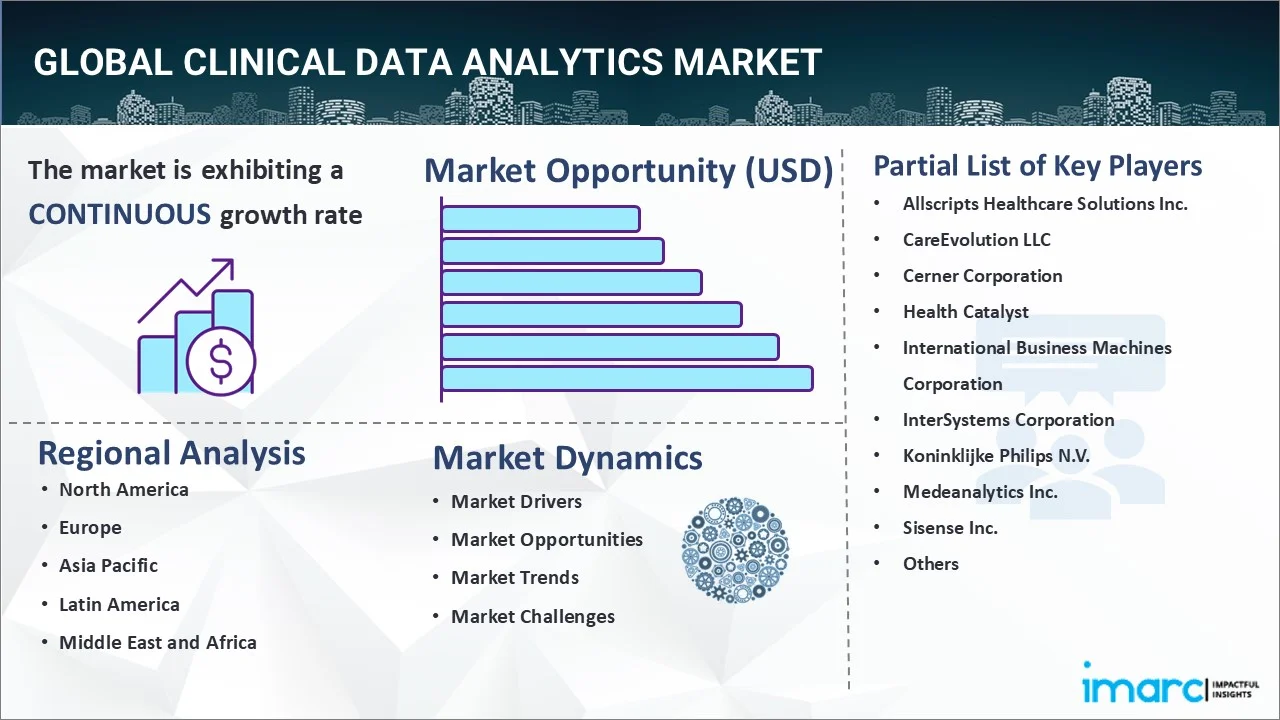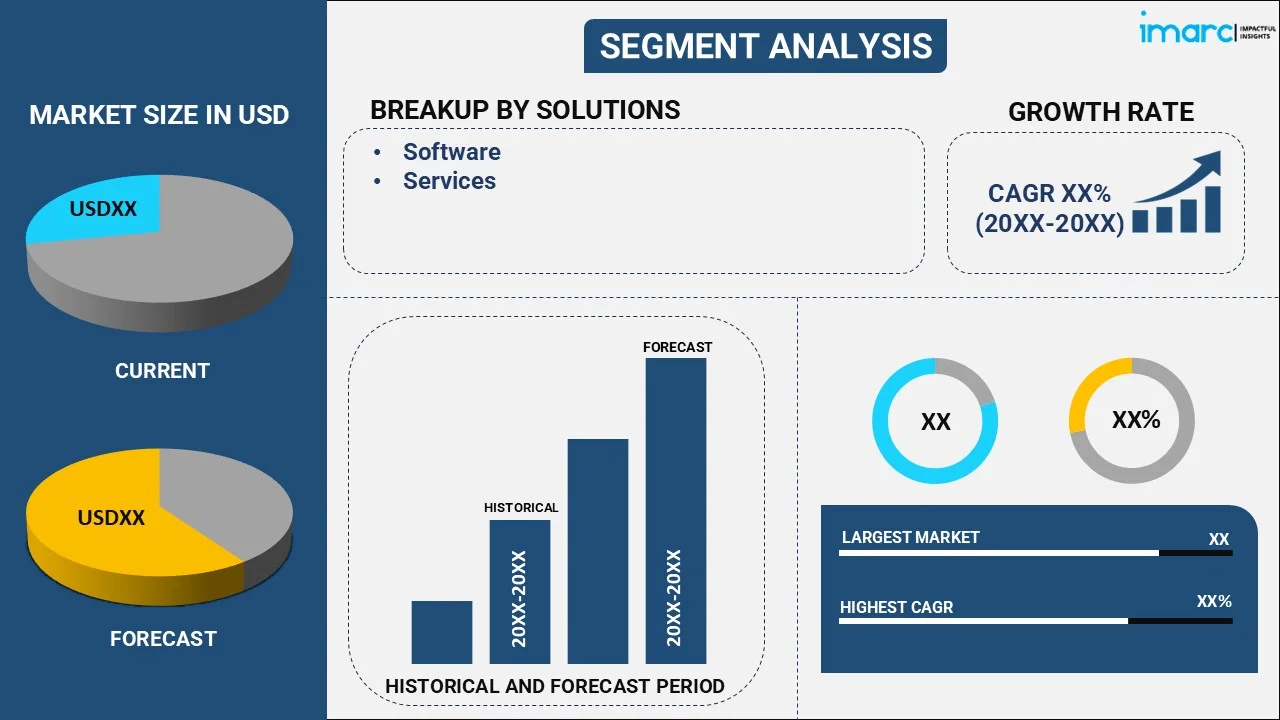
Clinical Data Analytics Market Report by Solution (Software, Services), Deployment Mode (Cloud-Based, On-Premises), Application (Quality Improvement and Clinical Benchmarking, Clinical Decision Support, Regulatory Reporting and Compliance, Comparative Analytics, Precision Health), End User (Pharmaceutical Companies, Healthcare Organizations, Research Organizations, Government Organizations), and Region 2025-2033
Market Overview:
The global clinical data analytics market size reached USD 26.3 Billion in 2024. Looking forward, IMARC Group expects the market to reach USD 311.8 Billion by 2033, exhibiting a growth rate (CAGR) of 30.02% during 2025-2033.
|
Report Attribute
|
Key Statistics
|
|---|---|
|
Base Year
|
2024
|
|
Forecast Years
|
2025-2033
|
|
Historical Years
|
2019-2024
|
|
Market Size in 2024
|
USD 26.3 Billion |
|
Market Forecast in 2033
|
USD 311.8 Billion |
| Market Growth Rate 2025-2033 | 30.02% |
Clinical data analytics transforms structured and unstructured medical data into a single, standardized ecosystem in real-time. It relies on sophisticated machine learning (ML) analysis to generate predictive and hidden insights. It assists healthcare providers in making informed decisions, providing clinical decision support, improving population health, enhancing care coordination, and improving patient wellness. As a result, it is widely adopted by health organizations across the globe to retrieve data concerning different aspects of health system performance, such as patient outcomes, population health, and clinical quality. Besides this, it can help reduce medication errors, minimize administrative costs, and increase revenues.

To get more information on this market, Request Sample
Clinical Data Analytics Market Trends:
The increasing usage of electronic health records (EHRs) on account of rapid digitization in healthcare management has led to vast amounts of clinical data. This represents one of the key factors driving the need for clinical data analytics to streamline information and minimize human errors. This can also be attributed to the increasing application of EHR solutions in improving patient care coordination and accessing information in real-time due to a significant impact of coronavirus disease (COVID-19) on healthcare infrastructure worldwide. Apart from this, the emergence of m-health apps, in confluence with the increasing emphasis on high-quality personalized care in hospitals, is contributing to the market growth. Moreover, several health organizations are integrating clinical data analytics to address the challenges of changing governmental regulations while lowering healthcare costs and improving the overall quality of patient care. Besides this, rising investments in clinical studies of new drugs due to the growing prevalence of chronic diseases are anticipated to positively influence the demand for clinical data analytics across the globe.
Key Market Segmentation:
IMARC Group provides an analysis of the key trends in each sub-segment of the global clinical data analytics market report, along with forecasts at the global, regional and country level from 2025-2033. Our report has categorized the market based on solution, deployment mode, application and end user.
Breakup by Solution:

- Software
- Services
Breakup by Deployment Mode:
- Cloud-based
- On-premises
Breakup by Application:
- Quality Improvement and Clinical Benchmarking
- Clinical Decision Support
- Regulatory Reporting and Compliance
- Comparative Analytics
- Precision Health
Breakup by End User:
- Pharmaceutical Companies
- Healthcare Organizations
- Research Organizations
- Government Organizations
Breakup by Region:
.webp)
- North America
- United States
- Canada
- Asia-Pacific
- China
- Japan
- India
- South Korea
- Australia
- Indonesia
- Others
- Europe
- Germany
- France
- United Kingdom
- Italy
- Spain
- Russia
- Others
- Latin America
- Brazil
- Mexico
- Others
- Middle East and Africa
Competitive Landscape:
The competitive landscape of the industry has also been examined along with the profiles of the key players being Allscripts Healthcare Solutions Inc., CareEvolution LLC, Cerner Corporation, Health Catalyst, International Business Machines Corporation, InterSystems Corporation, Koninklijke Philips N.V., Medeanalytics Inc., Sisense Inc., UnitedHealth Group Incorporated and Xerox Holdings Corporation.
Report Scope:
| Report Features | Details |
|---|---|
| Base Year of the Analysis | 2024 |
| Historical Period | 2019-2024 |
| Forecast Period | 2025-2033 |
| Units | Billion USD |
| Segment Coverage | Solution, Deployment Mode, Application, End User, Region |
| Region Covered | Asia Pacific, Europe, North America, Latin America, Middle East and Africa |
| Countries Covered | United States, Canada, Germany, France, United Kingdom, Italy, Spain, Russia, China, Japan, India, South Korea, Australia, Indonesia, Brazil, Mexico |
| Companies Covered | Allscripts Healthcare Solutions Inc., CareEvolution LLC, Cerner Corporation, Health Catalyst, International Business Machines Corporation, InterSystems Corporation, Koninklijke Philips N.V., Medeanalytics Inc., Sisense Inc., UnitedHealth Group Incorporated and Xerox Holdings Corporation. |
| Customization Scope | 10% Free Customization |
| Post-Sale Analyst Support | 10-12 Weeks |
| Delivery Format | PDF and Excel through Email (We can also provide the editable version of the report in PPT/Word format on special request) |
Key Questions Answered in This Report
The global clinical data analytics market was valued at USD 26.3 Billion in 2024.
We expect the global clinical data analytics marketto exhibit a CAGR of 30.02% during 2025-2033.
The sudden outbreak of the COVID-19 pandemic has led the growing deployment of clinical data analytics, owing to the escalating requirement of EHR solutions for improving patient care coordination and accessing information in real-time.
The increasing adoption of Electronic Health Records (EHRs), along with the rising demand for clinical data analytics to streamline information and minimize human errors, is primarily driving the global clinical data analytics market.
Based on the solution, the global clinical data analytics market has been divided into software and services, where software currently exhibits a clear dominance in the market.
Based on the deployment mode, the global clinical data analytics market can be categorized into cloud-based and on-premises. Currently, on-premises account for the majority of the total market share.
Based on the application, the global clinical data analytics market has been segregated into quality improvement and clinical benchmarking, clinical decision support, regulatory reporting and compliance, comparative analytics, and precision health. Among these, comparative analytics currently hold the largest market share.
Based on the end user, the global clinical data analytics market can be bifurcated into pharmaceutical companies, healthcare organizations, research organizations, and government organizations. Currently, healthcare organizations exhibit a clear dominance in the market.
On a regional level, the market has been classified into North America, Asia-Pacific, Europe, Latin America, and Middle East and Africa, where North America currently dominates the global market.
Some of the major players in the global clinical data analytics market include Allscripts Healthcare Solutions Inc., CareEvolution LLC, Cerner Corporation, Health Catalyst, International Business Machines Corporation, InterSystems Corporation, Koninklijke Philips N.V., Medeanalytics Inc., Sisense Inc., UnitedHealth Group Incorporated, and Xerox Holdings Corporation.
Need more help?
- Speak to our experienced analysts for insights on the current market scenarios.
- Include additional segments and countries to customize the report as per your requirement.
- Gain an unparalleled competitive advantage in your domain by understanding how to utilize the report and positively impacting your operations and revenue.
- For further assistance, please connect with our analysts.
 Request Customization
Request Customization
 Speak to an Analyst
Speak to an Analyst
 Request Brochure
Request Brochure
 Inquire Before Buying
Inquire Before Buying




.webp)




.webp)












